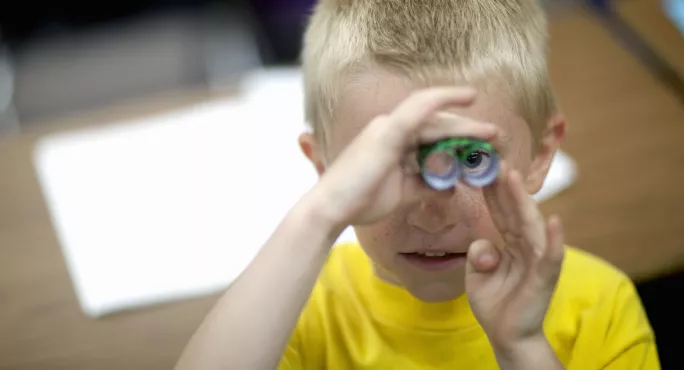- Home
- Analysis
- Early Years
- Early years catch-up must go further
Early years catch-up must go further

It’s well established that early childhood is a crucial period of a child’s development, and that access to high-quality early education and care is associated with better outcomes across a range of measures.
The pandemic has, of course, robbed many young children of the opportunity to experience the full benefits that high-quality early years provision can bring, with early years settings severely disrupted.
Due to lockdowns and social distancing measures, many children were not able to attend settings for significant periods and, thereby, missed out on activities and social interactions that provide important contributions to social and emotional development, such as learning how to build relationships and manage emotions and interactions.
Children also had less contact with others outside of the family, including play dates and opportunities to socialise with their peers.
Meanwhile, parents faced increased pressures on multiple fronts, from work, finances, health and bereavement, while managing childcare, leading to a decline in parents’ mental health and negatively impacting the home environment, where children have necessarily had to spend more time.
In more extreme cases, children faced an increased risk of abuse, neglect and domestic violence. And, as the home environment gained even more significance, inequalities in children’s home environments persisted.
Evidence suggests children of nursery age during the pandemic had a more difficult transition to starting school.
For example, the Education Endowment Foundation (EEF) School Starters study found 76 per cent of schools reported children starting school in the autumn of 2020 needed more support compared to previous cohorts and the majority of schools highlighted personal, social and emotional development as one of the areas that children were particularly struggling with, along with language and communication and literacy.
Meanwhile, a study by the Sutton Trust found parents reported negative impacts of the closure of settings on children’s social and emotional development in particular, more so than for language and physical development.
These findings echo evidence from Ireland that the pandemic has negatively affected children’s social and emotional wellbeing. Importantly, these impacts are likely to be uneven and exacerbate existing inequalities.
The importance of children’s socioemotional development
The disruption to children’s experiences during this critical life stage has raised concerns about the impact this will have on their socioemotional development.
Socioemotional skills gained in childhood have also been shown to have important effects across the life course and into adulthood, including mental and physical health and labour market outcomes.
Healthy socioemotional development is important in its own right but it also relates to other outcomes and is a prerequisite for children to engage with learning when they start school.
Particularly at this younger age, socioemotional development is highly related to language and communication development; being able to communicate with others supports the development of social skills.
As the two go hand in hand, efforts to address the negative impacts of the pandemic should focus on both.
What is being done by the government to address this?
So far, the government’s response has fallen short. It is disappointing that there is a lack of focus on early years in the Schools White Paper - a second blow after being overlooked in Levelling Up White Paper, also.
As part of its education recovery programme, the government announced additional funding for training early years staff, with a focus on speech and language as well as “physical and emotional development”.
However, this is in the context of settings struggling with funding as attendance rates remain low and many settings have been forced to close. Money for CPD without addressing the more fundamental needs of settings will have a limited impact.
Finally, the Nuffield Early Language Intervention (NELI) programme has been made available for state-funded school Reception pupils and has reached two-thirds of English primary schools to date. However, we cannot wait until children are in Reception to provide support for their socioemotional and language development - we need to target younger children too.
What other initiatives are filling the gaps?
The work of alternative and third sector organisations has become even more important in plugging these gaps in Covid recovery. In London, a series of programmes funded under the Mercers’ Company’s Early Years Special Initiative by the Charity of Sir Richard Whittington are doing just that.
These range from inclusive activities with theatre company Chickenshed to teaching new skills and building community with Scouts’ Early Years programme Squirrels, and story-based learning using high-quality texts at Ark Start nurseries.
These programmes, along with many others, are doing some amazing work to improve children’s socioemotional development, but the government needs to ensure it is not left to the efforts of such organisations alone.
Restrictions may have lifted but the pandemic and its effects are not over. Attendance rates at early years settings and take-up of the 2-year-old entitlement are still below pre-pandemic levels and young children continue to miss out on socialisation opportunities.
Early years settings need much more support from the government to adequately address these problems. Failing to act now is likely to prove costly.
Dr Kerris Cooper is a senior researcher in Early Years at the Education Policy Institute. She tweets @cooperkerris
You need a Tes subscription to read this article
Subscribe now to read this article and get other subscriber-only content:
- Unlimited access to all Tes magazine content
- Exclusive subscriber-only stories
- Award-winning email newsletters
Already a subscriber? Log in
You need a subscription to read this article
Subscribe now to read this article and get other subscriber-only content, including:
- Unlimited access to all Tes magazine content
- Exclusive subscriber-only stories
- Award-winning email newsletters
topics in this article



